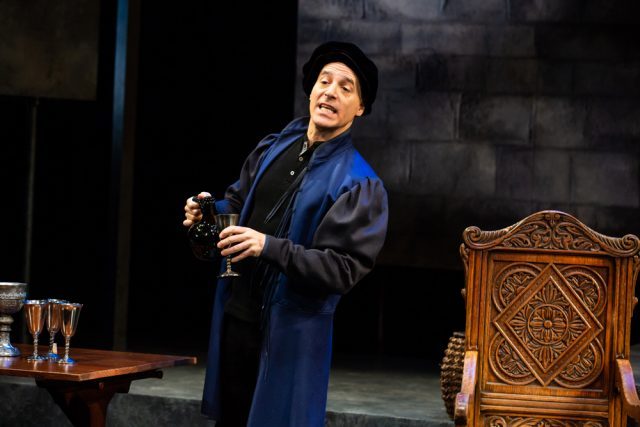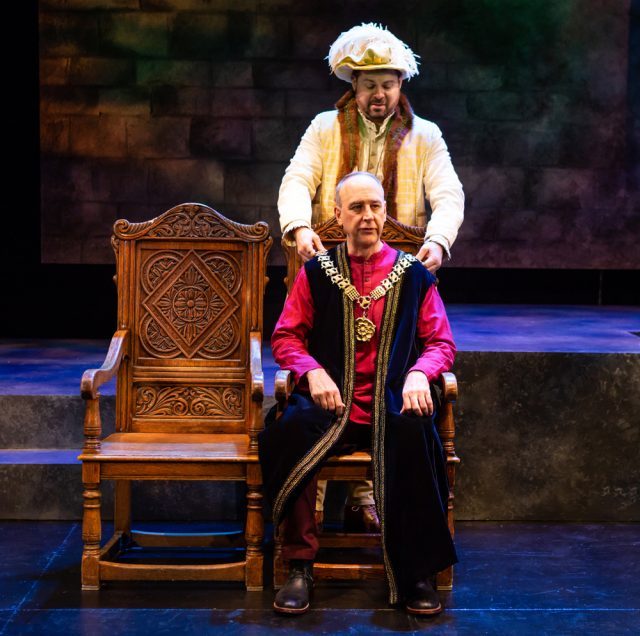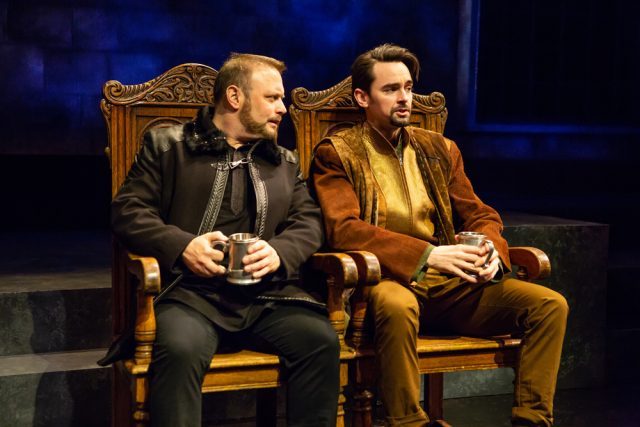
Harry Bouvy’s Common Man guides the audience through revival of A Man for All Seasons at the Acorn (photo by J. Daniel)
The Acorn Theatre at Theatre Row
410 West 42nd St. between Ninth & Tenth Aves.
Tuesday – Sunday through March 3, $30-$95
212-560-2183
fpatheatre.com
www.theatrerow.org
It’s one of the great moments of film and theater, an exchange of such brilliance that it wraps you in the sheer beauty of what the English language can achieve. It comes in the latter part of Robert Bolt’s A Man for All Seasons, which is currently enjoying a superb revival at the Acorn at Theatre Row. Sir Thomas More is being interrogated because of his refusal to approve of King Henry VIII’s divorce from Catherine of Aragon so he can marry his lover, Anne Boleyn, and have a male heir to the throne, a divorce the pope will not approve. More’s friend the Duke of Norfolk argues, “Can’t you do what I did, and come with us, for fellowship?” Ever so calmly and reasonably, More replies, “And when we stand before God, and you are sent to Paradise for doing according to your conscience, and I am damned for not doing according to mine, will you come with me, for fellowship?” First written for radio in 1954 and then live television in 1957, A Man for All Seasons was expanded to a full-length play in 1960, when it opened at the Globe, followed by a Broadway run the next year, winning Tonys for Best Actor (Paul Scofield), Best Director (Noel Willman), and Best Play. Bolt’s 1966 cinematic adaptation won six Oscars, for Best Picture, Best Director (Fred Zinnemann), Best Actor (Scofield), Best Adapted Screenplay (Bolt), Best Cinematography (Ted Moore), and Best Costume Design (Elizabeth Haffenden and Joan Bridge).

King Henry VIII (Trent Dawson) names Thomas More Lord Chancellor in Robert Bolt’s A Man for All Seasons (photo by J. Daniel)
Over the years, More has been portrayed by such actors as Charlton Heston, Sir Ian McKellen, Frank Langella, and Charles Dance. In the aptly named Fellowship for Performing Arts (FPA) production at the Acorn, where it has been extended through March 3, More is played by Michael Countryman with an amiable grace. Tall and thin, Countryman has a mild-mannered demeanor that belies More’s intense dedication to his steadfast belief in right and wrong — and the separation between church and state. First, Cardinal Wolsey (John Ahlin), then the Duke of Norfolk (Kevyn Morrow), Thomas Cromwell (Todd Cerveris), Archbishop of Canterbury Thomas Cranmer (Sean Dugan), and the king himself (Trent Dawson), try to get More to change his mind, but he’s not budging. He’s also very careful not to say anything that could eventually get him imprisoned and executed. As matters become more serious, his daughter, Margaret (Kim N. Wong), her partner, Will Roper (Dugan), and More’s beloved wife, the strong-willed Lady Alice (Carolyn McCormick), don’t understand why he won’t bend. But even at the possibility of never seeing his cherished family again, he is a resolutely principled man who lives by his conscience. “There is my right arm. Take your dagger and saw it from my shoulder, and I will laugh and be thankful, if by that means I can come with Your Grace with a clear conscience,” More explains to the king, who replies a few moments later, “No opposition, I say! No opposition! Your conscience is your own affair.” Later, More tells Cromwell, his inquisitor, “In matters of conscience, the loyal subject is more bounden to be loyal to his conscience than to any other thing.”

Thomas Cromwell (Todd Cerveris) and Richard Rich (David McElwee) plot to bring down Sir Thomas More in stellar revival (photo by J. Daniel)
Director Christa Scott-Reed restores the Common Man, who is often cut from film and theatrical adaptations; played by Harry Bouvy, he frames the story, serves as narrator, and appears in multiple roles, including More’s steward, a boatman, and a jury foreman, all of which Bouvy plays with a wink and a nod at the audience. “All right! A Common Man! A sixteenth-century butler!” he declares in the beginning. “The sixteenth century is the Century of the Common Man. Like all the other centuries.” He also changes clothing often (the classy period costumes are by Theresa Squire) and rotates parts of Steven C. Kemp’s set to indicate moving from the More home and garden to Cardinal Wolsey’s office, a dock, a private room in an inn, and a prison. The pacing of the two-and-a-half-hour show matches Sir Thomas’s approach to life, dignified and steady; it’s a talky play, but it never gets bogged down, since the words are so exquisite. The cast is uniformly excellent, with particularly strong turns by McCormick as More’s ever-loyal wife, Ahlin as both the scheming Wolsey and the sneaky Spanish ambassador Chapuys, and David McElwee as the overly ambitious, conniving Richard Rich. In addition, Scott-Reed doesn’t force contemporary relevance onto the narrative, as references to fake news, governmental corruption, and lies arise naturally in the audience’s mind; explicit references would only get in the way. Though fictionalized by Bolt (Lawrence of Arabia, Doctor Zhivago), A Man for All Seasons is primarily about perhaps the most devoted, principled character in the history of film and theater, a man willing to risk it all for his belief in the truth. “A clear and innocent conscience fears nothing,” Elizabeth I said to the Spanish ambassador decades after More’s death — but his values live on in Bolt’s marvelous play.